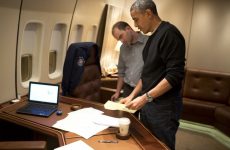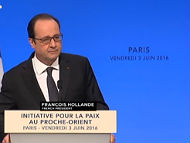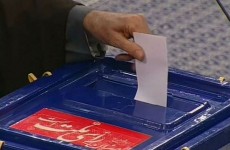Menashe Amir: ‘Opposition Is Mounting In Iran To President Ahmadinejad’s Nuclear Weapons Program’
‘Ahmadinejad’s Firing Of Nuclear Negotiator Larijani Signals Rift In Country’s Leadership’
‘Determined International Campaign On Various Fronts Will Succeed In Halting Iran’s Drive To Develop Nuclear Weapons’
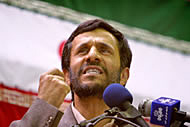
More and more Iranians now fear that President Ahmadinejad’s nuclear weapons is steering their country toward a global confrontation fraught with danger. This is the assessment of Menashe Amir, a leading Israeli expert on Iran, who monitors Iranian affairs on a daily basis. IsraCast presents analyst Amir’s five point plan for stopping Ahmadinejad which he outlined in a public lecture:

Ahmadinejad in his many declarations on the nuclear issue, contends repeatedly that: ‘Nuclear development is the inalienable right of the Iranian people’. He tries to present a unified front to the world in his attempt to convince the West and the entire world that all the Iranian people wish to achieve complete nuclear technology for ‘peaceful purposes’.
Is this indeed the case? The answer is brief: Not only are a majority of Iranians more and more convinced they do not want a global confrontation over the nuclear issue, but also more and more dissenting voices are being heard from inside the Iranian leadership itself. Concern is mounting that Iran’s nuclear policy will put the country on a collision course with both the U.S. and Israel and that this may seriously threaten the regime’s existence.
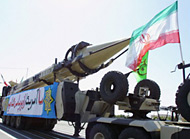 In this short lecture I shall endeavor to present some of the weaknesses in Iran’s nuclear policy front and their impact on the Iranian people and the leadership.
In this short lecture I shall endeavor to present some of the weaknesses in Iran’s nuclear policy front and their impact on the Iranian people and the leadership.
It can be said that in the past most citizens and supporters of Iran aspired to getting the bomb. The reasons are many and varied:
- Iran is a country of vast territory and rich oil and gas resources which were always coveted by her neighbors.
- In the nineteenth century a weak Iran was forced to cede much territory to the Russian empire.
- Iran also lost land in the north-east to the Afghans.
- And there is still a historic demand dating back to the Ottoman empire over Iran’s Azerbaijan.
- There is concern that Pakistan will demand control of the Balochistan in the Sistan region to the south-east.
- The policies of Czarist Russia and also of today’s Russian Federation have been based on the aspiration to reach the warm waters of the Persian Gulf.
- Iran was conquered temporarily by foreign forces in two world wars. -The Kurds speak openly of their aspiration to break away from Iran and to establish an independent Kurdish state.
- Arab speakers in southern Iran do not hide their desire to annex their territory with Arab states. In the 1960’s Nasser spoke of cutting off the region of Khuzestan from Iran and declaring the establishment of Arabistan.
- But last and most dangerous of all: Saddam Hussein’s invasion of Iran in 1980 which led to an eight year war between Iran and Iraq with the well known results.
Now taking all these facts into account, it is only natural that every national citizen or Iranian nationalist would wish his state to be nuclear armed in order to defend itself. In addition to all that has been said, some other consideration of the nuclear weapons supporters in Iran:
- The Soviet Union to the north (today’s Russia) is a nuclear power.
- Turkey enjoys a nuclear umbrella from NATO.
- Saddam Hussein’s Iraq planned on producing nuclear weapons.
- Iraq and Afghanistan are today under the American nuclear umbrella.
- Pakistan, as well as India, have been armed with nuclear weapons for some time.
- Israel, according to Iranian claims, has at least 200 nuclear bombs.
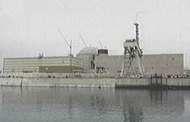
At the end of the 1990’s it was officially disclosed that Iran intended to acquire technology for producing nuclear fuel. It was clear to one and all that the real goal was to develop a nuclear bomb.
In the initial stage, support for Iran’s going nuclear, encompassed nearly all layers of the people. Even Iranian opposition members abroad backed the nuclear effort and condemned the Mujahedin Khalq as traitors for serving Western intelligence services by exposing information about Iran’s nuclear programs.
From a close monitoring of the situation in Iran, and from conversations with citizens inside Iran and abroad, my impression is that this popular support is fast receding. Today, more and more Iranians are conscious of the grave dangers in a confrontation with the West over the nuclear issue and the lack of efficacy in nuclear development by a state so rich in other fuel sources. As the oppression inside Iran increases, so does the opposition to the regime’s nuclear policy. I cannot disclose exact quotations from citizens who oppose nuclearization. The oppressive Iranian regime categorically bans the expression of any opinion that deviates from official policy. However let me repeat that I refer to conversations with listeners inside Iran and from contacts with Iranians in exile.
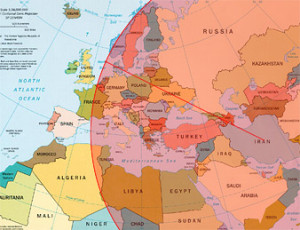
By harshening oppression and preventing free speech, Ahmadinejad attempted to turn Iran’s nuclear policy into an issue of national pride. He ordered the mobilization of all the people for propaganda against opposition in the West. We recall the demonstrations by school children who chanted: ‘Nuclear energy is our inalienable right’ (In Persian).
Ahmadinejad also mobilized university students, sportsmen, public servants, women and other groups of the population to form a human chain around the nuclear installations at Natanz, Esfahan, Bushehr and other sites.

He organized a ceremony, that appeared to be almost magical inside a spacious hall, to declare that an Iranian laboratory had succeeded in enriching several grams of uranium with a concentration of three or four percent. Imitating North Korea and other communist states, he even initiated the composing of a new opera and a symphony that glorified the nuclear program.
However, all this did not succeed in galvanizing popular support and I believe that if an objective poll were conducted in the country, a dominant percentage of citizens would vote against the nuclear program. Or at least they would favor a temporary freeze until the controversy dies down or a regime change takes place.
The Iranians really fear the danger of an American invasion of their state (something that still has little prospect) and also the possibility that the nuclear facilities will be bombed (a step which would spark the flames of war). Moreover, recently another negative factor has arisen against the nuclear program:
Iranian citizens are apparently convinced that if Iran gets the bomb the regime will have an insurance policy to discourage any international protest against the trampling of human rights in the country. For many years, Europe conducted a ‘constructive dialogue’ with Iran on human rights (Today the disappointing results are clearly apparent). Once Iran acquires nuclear weapons and threatens the world, no state will dare demand that Tehran honor basic human principles.
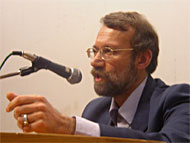
Not only do many Iranian citizens object to the nuclear policy and hope for its suspension, but also the regime itself is split – at least when it comes to tactics, if not strategy.
Here are some cases in point:
- Eleven years ago Ayatollah Rafsanjani said: ‘One Islamic bomb is capable of destroying Israel but several Israeli bombs will only cause minor damage to the Islamic state’. Today he criticizes, almost openly, Ahmadinejad’s policy. In one of his Friday sermons in Tehran he criticized the president quite openly contending that his nuclear policy has aroused the entire world against Iran.
- Hassan Rohani, who during Khatami’s time, conducted Iran’s nuclear talks with the international community, has become more and more critical of Ahmadinejad’s nuclear policy. Several months ago he mocked the President for continuing to declare that he defies the passing of the Iran file to the U.N. Security Council and that stiffening sanctions will have no impact on Iran.
- On the other side, just last month, Ahmadinejad severely criticized these three figures charging they had spread irresponsible statements and voiced opinions that contradicted Iran’s official position. He even accused them of stabbing the regime in the back and signaling the West that it was possible to step up pressure on the Iranian leadership because it was split.
- But perhaps the most important point is the quiet struggle between the spiritual leader Khamenei and Ahmadinejad over the subject of nuclear policy. This September when the crisis in relations between Europe and Iran deteriorated even further, Khamenei sent Hassan Rohani to discussions in Germany. This step angered Ahmadinejad who started a steam roller of pressure to bar Rohani from conducting talks with Javier Solana, the European Union’s foreign policy representative and who is in charge of the E.U.’s nuclear contacts with Iran. The pressure succeeded and Rohani was forced to return to Tehran.
- A second severe confrontation between Khamenei and Ahmadinejad again erupted over the resignation (or dismissal) of Ali Larijani as head of the nuclear talks. A close scrutiny of events in Iran leads me to the conclusion that Ahmadinejad forced Larijani to resign; while Khamenei insisted that Larijani remain in the nuclear talks picture. At last week’s meeting with Javier Solana, Larijani’s was an active participant along with Saeed Jalili. So in this case, Khamenei imposed his will on Ahmadinejad in their hidden rivalry – but for how long it is hard to say.
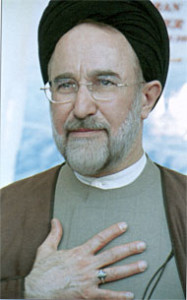
What I believe can be said is that resignation (or sacking) of Larijani is solid proof of the deep split among the Iranian leadership over nuclear policy.
Two years ago, when Larijani took up his position, he was extremely critical of Khatami’s policy and how Hassan Rohani had conducted the nuclear talks. Reacting to these figures’ consent to a two-year suspension of Iran’s nuclear programs in return for civilian nuclear know-how from the West, Larijani stated: ‘They (Khatami – Rohani) gave the West the precious pearls of Iran and received some paltry candies’. However, after two years of talks with world figures and close involvement with international diplomacy, apparently drew Larijani to the conclusion that Iran could not defy the will of the world. Larijani apparently realized that Tehran’s stubborn refusal to stop its nuclear enrichment program (in accordance with Security Council resolutions) would plunge Iran toward an inevitable military confrontation with the U.S. and Israel. Therefore he apparently recommended to Ahmadinejad that he reconsider his policy and alter his tactics.
Everything I have said is only a small part of the gigantic struggle being waged today inside the regime over nuclear policy. The debate is still not about whether Iran needs the bomb or not. At this stage, the debate is limited to the question of what are the right tactics to fulfill the nuclear policy without sparking a confrontation with the world. Israel and the western nations must closely monitor what transpires on this level.
Much has been said about the dangers of Iran’s going nuclear, allow me to summarize them:
- Iran has an extreme ideology which aspires to resurrecting the ‘Islamic Caliphate’ (this time headed by the Shi’a).
- Iran’s spiritual leadership contends that whoever is not a Shi’a Muslim is a corrupt beast on the face of the earth.
- The fulfillment of the Iranian leadership’s aspirations calls for the destruction of Israel and enacting a new Holocaust (and that is why Ahmadinejad so vehemently denies the Holocaust of World War Two).
- In order to to fulfill its religious-political vision, Iran tries to sabotage the Israeli-Palestinian peace process.
- Iran has founded terror organizations such as Hezbollah in Lebanon and the Palestinian Jihad and is deeply involved in terror attacks in Iraq and Afghanistan.
- Ahmadinejad awaits the coming of the Mahdi (the Shi’a Messiah) and has actually prepared Hotel Jamkaran in northern Tehran for him.
- Iran has developed the Shihab missile and according to President Bush will be armed with a ballistic missile that can hit the eastern seaboard of the U.S. by two thousand and fifteen.
- And the very same Iran develops nuclear weapons in order to fulfill its dreams and implement its ideology and religious aspirations after a fourteen hundred year quarrel with Sunni Islam.
Is the prevention of Iran from acquiring nuclear weapons a lost cause?
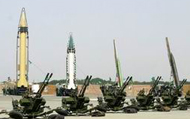 My answer is Negative. I believe the world, if it wishes, can prevent it from doing so.
My answer is Negative. I believe the world, if it wishes, can prevent it from doing so.
Here is a five-point program, which despite all the risks in its implementation, appears to me to be the sole way to eliminate the danger.
- Create a very real military threat by concentrating naval forces in the Persian Gulf and voicing threats of war at the Iranian regime.
- Widening international sanctions that will paralyze the Iranian economy in the same manner as Gaddafi’s Libya.
- Encourage ethnic minorities in Iran to launch guerrilla warfare against the regime.
- Transfer funds to opposition bodies inside Iran to finance strikes, demonstrations, and other resistance activities.
- Rally three million Iranian exiles to lobby leaders in the countries they are now living to join the international effort to effect a regime change in Iran.
I believe that the implementation of all these five points both simultaneously and extensively can lead to the elimination of the Iranian nuclear threat.


